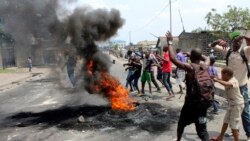Although the fight for political freedoms is a universal challenge, three African nations – Burundi, Democratic Republic of Congo, and the Republic of Congo – experienced a significant increase in human rights abuses related to their elections in 2015.
Burundi’s human rights climate took a turn for the worse in April 2015 when the ruling political party, the National Council for the Defense of Democracy – Forces for the Defense of Democracy announced that the incumbent President, Pierre Nkurunziza, would run for a third term, in which he won in July 2015, in violation of the Arusha Agreement.
Human rights monitors have documented at least 474 individuals killed since April 2015, including 130 targeted assassinations. Other serious human rights abuses linked to the political crisis include extrajudicial killings, including reports of victims disposed of in mass graves; arbitrary and politicized detention, often in inhuman and life-threatening conditions; and widespread government disregard for the freedoms of speech, press and media, assembly, and association; and sexual and gender-based violence.
In The Republic of the Congo on October 25, the ruling Congolese Labor Party and its allies won a landslide victory in a referendum to amend the constitution to allow President Denis Sassou Nguesso to run for a third term.35 civilians were reported killed during demonstrations leading up to the referendum, and voters faced intimidation and severe restrictions on basic freedoms.
In January 2015 political tensions intensified in The Democratic Republic of Congo when protests erupted in Kinshasa, Goma, and Bukavu over a push by President Joseph Kabila’s Presidential Majority for electoral legislation mandating a nationwide census that would have delayed presidential elections past 2016. The United Nations Joint Human Rights Office confirmed 10 deaths, while Human Rights Watch reported 38 civilian deaths, five disappearances, and more than 300 arrests during the protests. Additionally, there were numerous reports of opposition members arrested in cities across the country.
Abuses have continued to increase; the UN has stated that it has documented more than 400 cases of human rights violations, including 52 arrests, since the beginning of 2016.
In all three cases the United States has expressed concerns for these trends both publically and privately. Universally it is the primary responsibility of the state to address human rights abuses through accountability and prevention. This is a challenge all over the world.


















